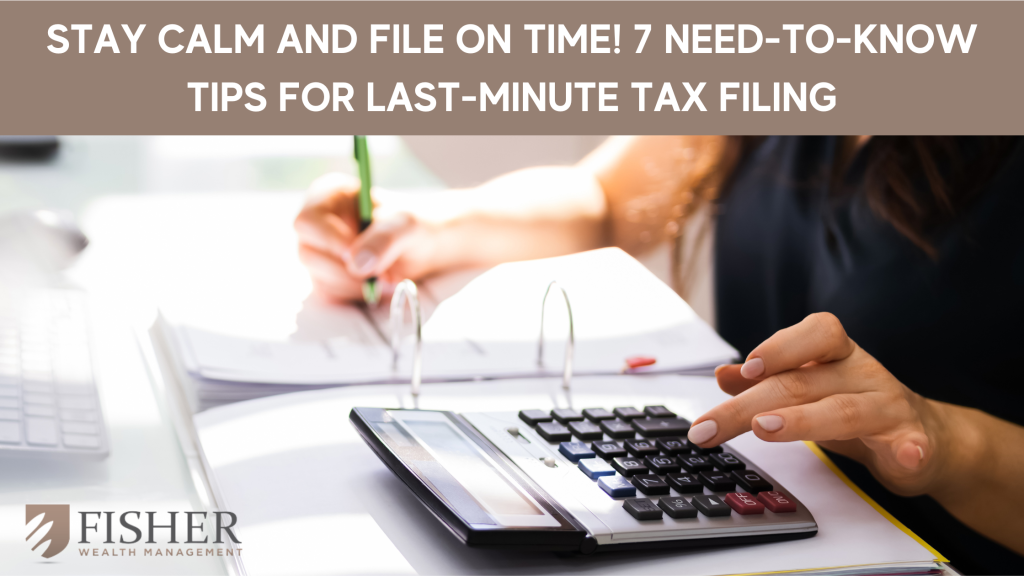
Stay Calm and File On Time! 7 Need-to-Know Tips for Last-Minute Tax Filing
Tax season always has a way of sneaking up on us. A quote by American writer Rita Mae Brown that could have easily been uttered by the IRS or any one of us goes, “If it weren’t for the last minute, nothing would get done.” According to Psychology Today, procrastination is right up there with being a basic human instinct when it comes to human behavior. If you know you usually wait until the last minute to file your taxes, a to-do list could help you stay motivated and on top of your responsibilities. Need help getting started? Here are six need-to-know tips for last-minute tax filing.
1. Don’t be late!
To avoid being considered late and potentially incurring interest and penalties, you will have to either mail your return by April 15th at midnight or file it electronically. This will require you to have a postmark for mailed-in returns or a timestamp for e-filed returns.
2. Consider electronic filing if you can.
If you prefer, e-filing with the IRS is available to any taxpayer. If your adjusted gross income (AGI) is $79,000 or less, you can e-file your individual tax return using the IRS Free File. If you are eligible, this could be a great way to save some money. According to an IRS report published by CNBC, about 70% of taxpayers, or nearly 100 million Americans are eligible for Free File.
3. Request an extension if needed.
As April 15th rapidly approaches and you feel you need more time, you may request an extension to file with Form 4868. An extension will give you until October 15th. However, remember that an extension is just time to file. You still have to estimate how much you owe in taxes and pay the IRS to avoid potential interest and penalties. The IRS stresses that making a payment, even just a small one, may help to reduce the amount owed in interest and penalty charges.
4. Double-check your work.
Last year, the IRS reported that 12.9 million errors were found in submitted tax returns. Given the complexity of even a basic tax return, it’s not surprising there were so many errors. It is crucial to take responsibility and double-check your work to potentially mitigate the need to amend your return or miss out on money left on the table due to an oversight.
5. Max out your health savings account (HSA).
Maxing out your HSA is beneficial because it offers a three-tiered tax advantage opportunity. Contributions are pre-tax (and tax-deductible), earnings are tax-deferred, and withdrawals that are qualified medical expenses are tax-free. Also, the funds roll over each year they aren’t used.
6. Max out your traditional and Roth IRA.
Because of the pre-tax rules, contributing to the traditional IRA is one way you may be able to reduce your tax bill. The benefit that comes from maxing out your Roth IRA is that tax rates are regularly changing. With a Roth, you pay taxes on your investment when contributing funds but then they grow and can be withdrawn in the future tax-free.
7. Consult a financial professional.
Taxes can be as complex as it gets when it comes to your finances. Your financial decisions could have long-term implications, not just in the present but also years down the road. Seeking the guidance of a financial professional can provide you with a sense of security and work to address that you’re making manageable decisions for your financial future.
Important Disclosures:
This material was created for educational and informational purposes only and is not intended as tax, legal or investment advice. If you are seeking investment advice specific to your needs, such advice services must be obtained on your own separate from this educational material.
The Roth IRA offers tax deferral on any earnings in the account. Withdrawals from the account may be tax free, as long as they are considered qualified. Limitations and restrictions may apply. Withdrawals prior to age 59 ½ or prior to the account being opened for 5 years, whichever is later, may result in a 10% IRS penalty tax. Future tax laws can change at any time and may impact the benefits of Roth IRAs. Their tax treatment may change.
All information is believed to be from reliable sources; however, LPL Financial makes no representation as to its completeness or accuracy.
Sources:
Here’s who qualifies for free tax filing through the IRS this season (cnbc.com)
7 Reasons To Max Out Your Roth IRA | Bankrate
HSA Taxes, FSA Taxes & How They Work in 2023-2024 – NerdWallet
Procrastination: A Basic Human Instinct | Psychology Today
TOP 25 LAST MINUTE QUOTES (of 121) | A-Z Quotes (azquotes.com)
This article was prepared by LPL Marketing Solutions
LPL Tracking # 562716